#education resources
Text
back to basics

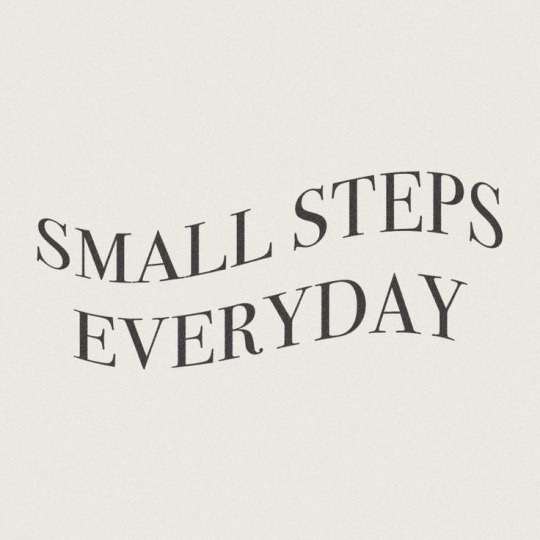
mostly free resources to help you learn the basics that i've gathered for myself so far that i think are cool
everyday
gcfglobal - about the internet, online safety and for kids, life skills like applying for jobs, career planning, resume writing, online learning, today's skills like 3d printing, photoshop, smartphone basics, microsoft office apps, and mac friendly. they have core skills like reading, math, science, language learning - some topics are sparse so hopefully they keep adding things on. great site to start off on learning.
handsonbanking - learn about finances. after highschool, credit, banking, investing, money management, debt, goal setting, loans, cars, small businesses, military, insurance, retirement, etc.
bbc - learning for all ages. primary to adult. arts, history, science, math, reading, english, french, all the way to functional and vocational skills for adults as well, great site!
education.ket - workplace essential skills
general education
mathsgenie - GCSE revision, grade 1-9, math stages 1-14, provides more resources! completely free.
khan academy - pre-k to college, life skills, test prep (sats, mcat, etc), get ready courses, AP, partner courses like NASA, etc. so much more!
aleks - k-12 + higher ed learning program. adapts to each student.
biology4kids - learn biology
cosmos4kids - learn astronomy basics
chem4kids - learn chemistry
physics4kids - learn physics
numbernut - math basics (arithmetic, fractions and decimals, roots and exponents, prealgebra)
education.ket - primary to adult. includes highschool equivalent test prep, the core skills. they have a free resource library and they sell workbooks. they have one on work-life essentials (high demand career sectors + soft skills)
youtube channels
the organic chemistry tutor
khanacademy
crashcourse
tabletclassmath
2minmaths
kevinmathscience
professor leonard
greenemath
mathantics
3blue1brown
literacy
readworks - reading comprehension, build background knowledge, grow your vocabulary, strengthen strategic reading
chompchomp - grammar knowledge
tutors
not the "free resource" part of this post but sometimes we forget we can be tutored especially as an adult. just because we don't have formal education does not mean we can't get 1:1 teaching! please do you research and don't be afraid to try out different tutors. and remember you're not dumb just because someone's teaching style doesn't match up with your learning style.
cambridge coaching - medical school, mba and business, law school, graduate, college academics, high school and college process, middle school and high school admissions
preply - language tutoring. affordable!
revolutionprep - math, science, english, history, computer science (ap, html/css, java, python c++), foreign languages (german, korean, french, italian, spanish, japanese, chinese, esl)
varsity tutors - k-5 subjects, ap, test prep, languages, math, science & engineering, coding, homeschool, college essays, essay editing, etc
chegg - biology, business, engineering/computer science, math, homework help, textbook support, rent and buying books
learn to be - k-12 subjects
for languages
lingq - app. created by steve kaufmann, a polygot (fluent in 20+ languages) an amazing language learning platform that compiles content in 20+ languages like podcasts, graded readers, story times, vlogs, radio, books, the feature to put in your own books! immersion, comprehensible input.
flexiclasses - option to study abroad, resources to learn, mandarin, cantonese, japanese, vietnamese, korean, italian, russian, taiwanese hokkien, shanghainese.
fluentin3months - bootcamp, consultation available, languages: spanish, french, korean, german, chinese, japanese, russian, italian.
fluenz - spanish immersion both online and in person - intensive.
pimsleur - not tutoring** online learning using apps and their method. up to 50 languages, free trial available.
incase time has passed since i last posted this, check on the original post (not the reblogs) to see if i updated link or added new resources. i think i want to add laguage resources at some point too but until then, happy learning!!
#study#education resources#resources#learning#language learning#math#english languages#languages#japanese#mandarin#arabic#italian#computer science#wed design#coding#codeblr#fluency#online learning#learn#digital learning#education#studyinspo#study resources#educate yourselves#self improvement#mathematics#mathblr#resource
275 notes
·
View notes
Text
If someone is an educator in Florida and knows about FAST tests, please I need your help
I teach an immigrant child on zoom who is in grade 4th and she struggles very much with essay writing
Her parents gave me chatgpt as a resource to teach her how to write and I can't even tell how appalled I was
I need some resources because the pattern of education is very different from my country and I don't want to rely on AI to teach a kid how to write
Please help!
15 notes
·
View notes
Text
Resource Masterlist
Art
Cooking
Education
Entertainment
Finances
Health
Home
Life skills
Mental health
Self care
Studying
Technology
Travel
*I will update this as I add more resources to my blog.*
#resources#cooking#cooking resources#technology#mental health#mental heath resources#self care#studying#study tips#focus#task management#entertainment#education#education resources#art#art tutorials#art resources#life skills#home#home resources#finaces#money#money resources#travel#travel resources#health#health resources
73 notes
·
View notes
Text
3 notes
·
View notes
Text
I think a very important thing for people who say they feel helpless right now to do is to take the time to do their research on Palestine and its history and how we even got to this point. I will always recommend reading decolonizepalestine.com it has so much information and debunks so many of the myths people believe surrounding Palestine and Israel. Being able to get informed and help spread Palestinian’s voices and history is an easy and free way to keep the conversation going and get people to take this genocide seriously.
#keep boycotting keep demanding ceasefire keep protesting and keep getting educated#palestine#resources#🦢
3K notes
·
View notes
Text
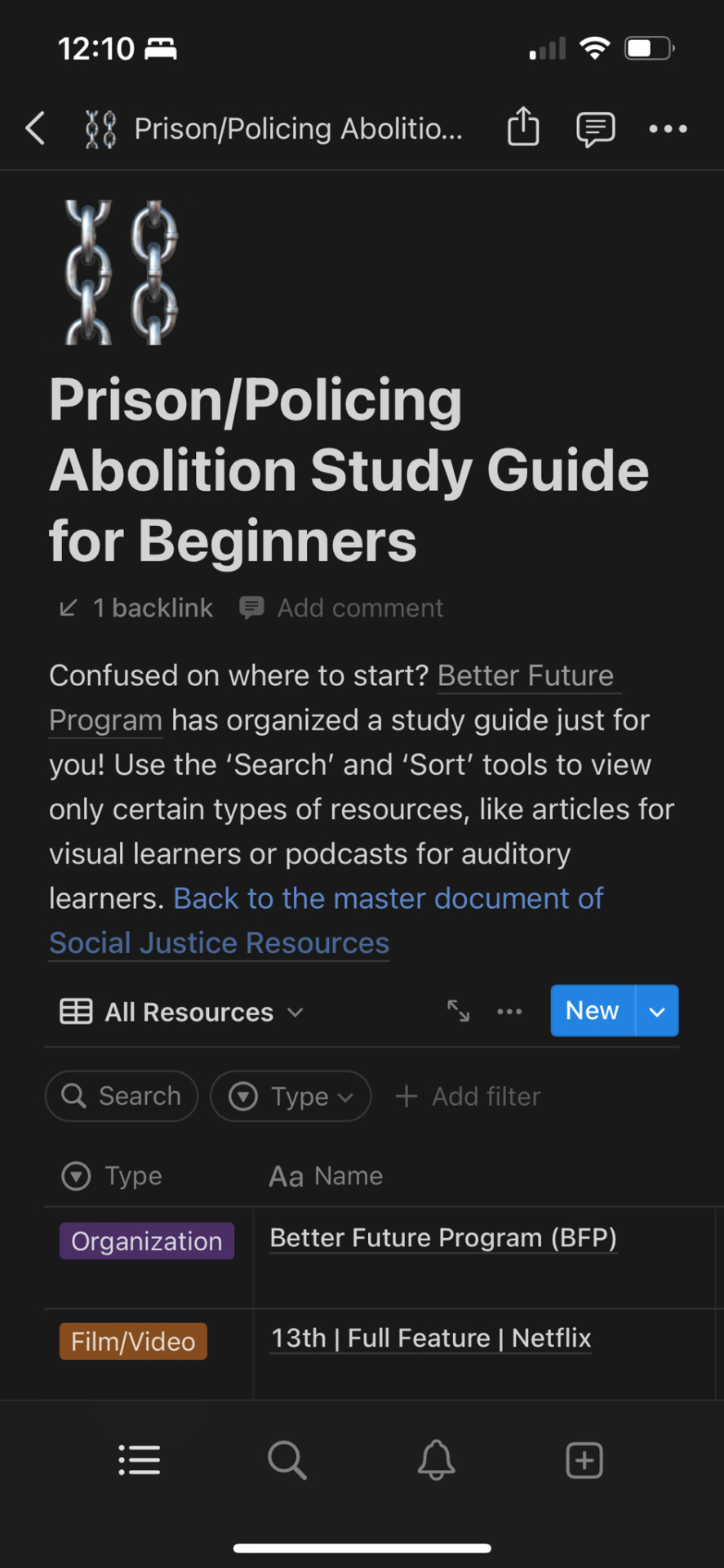
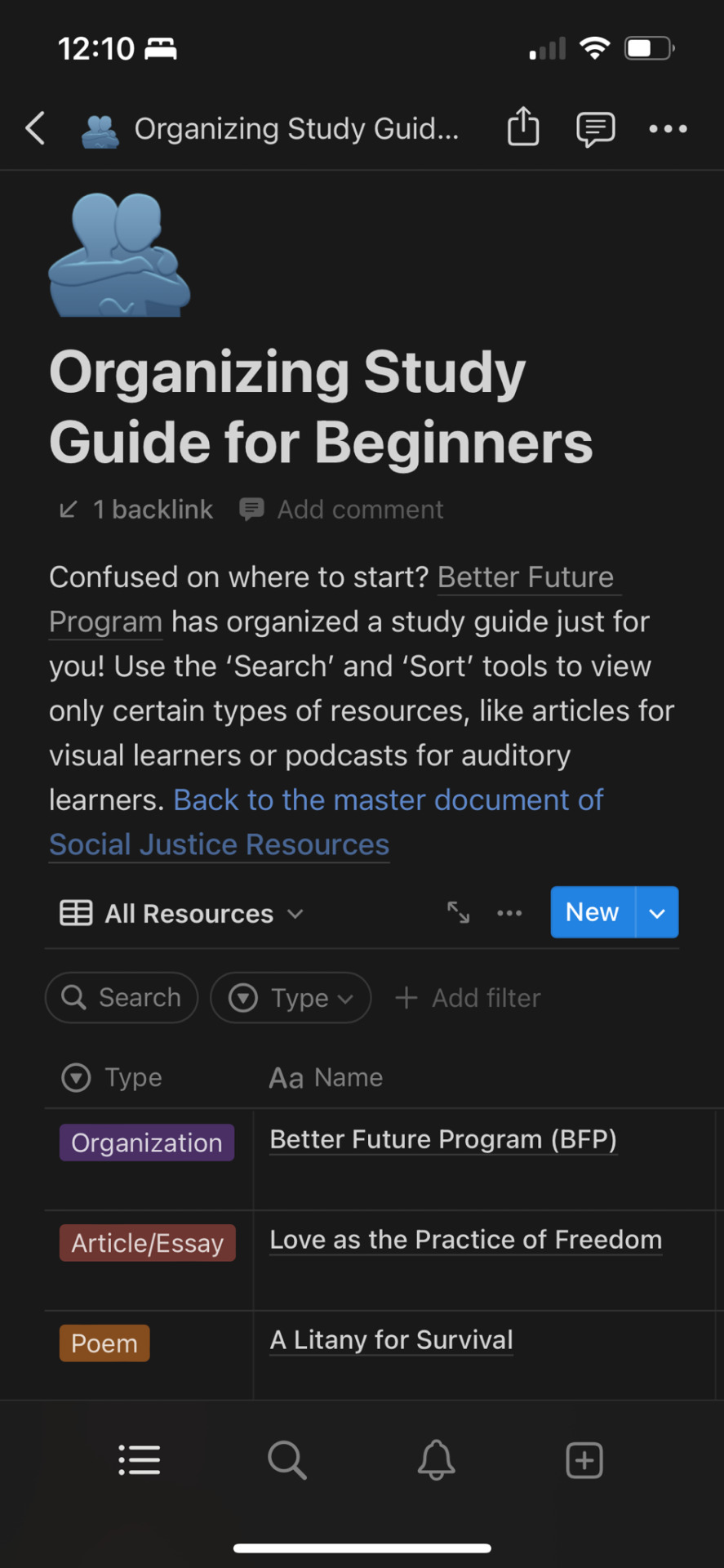

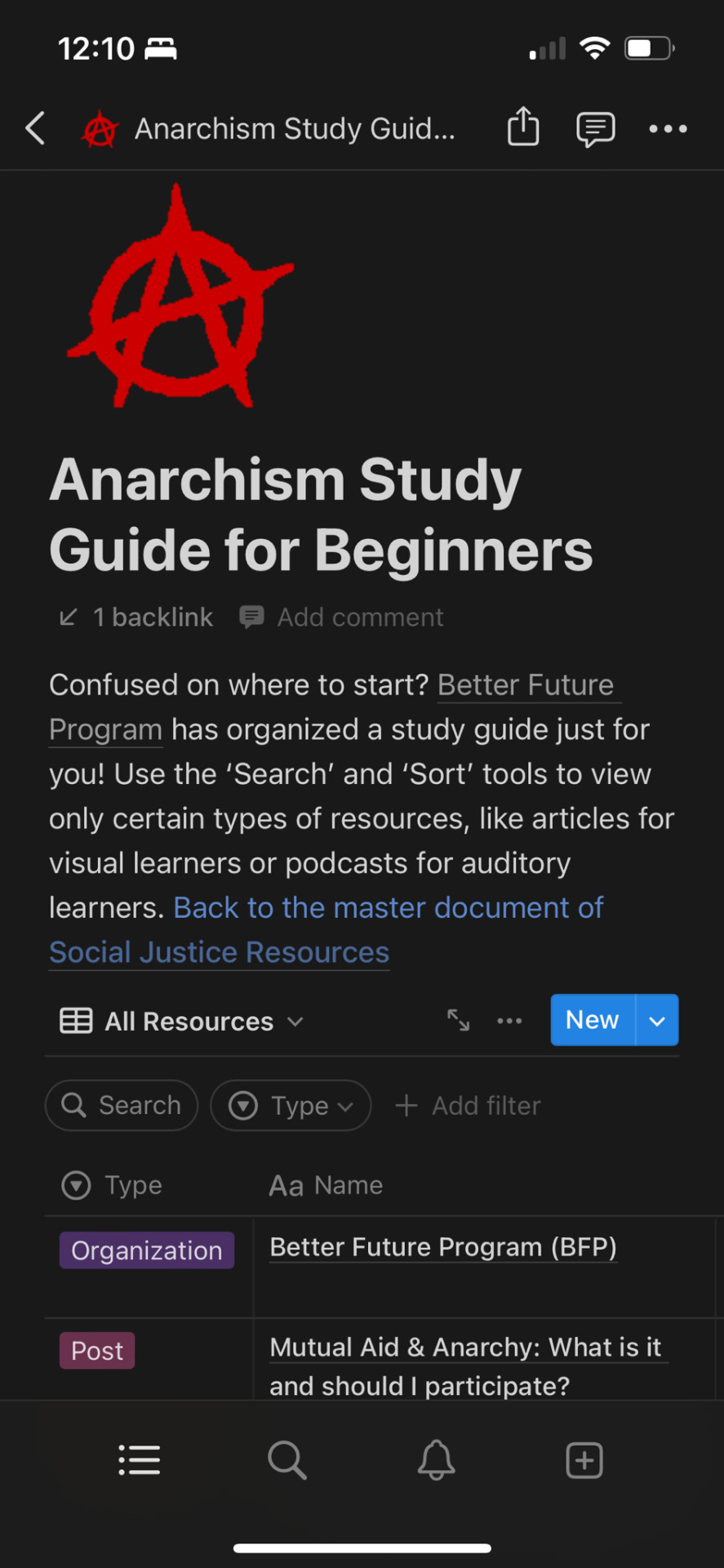
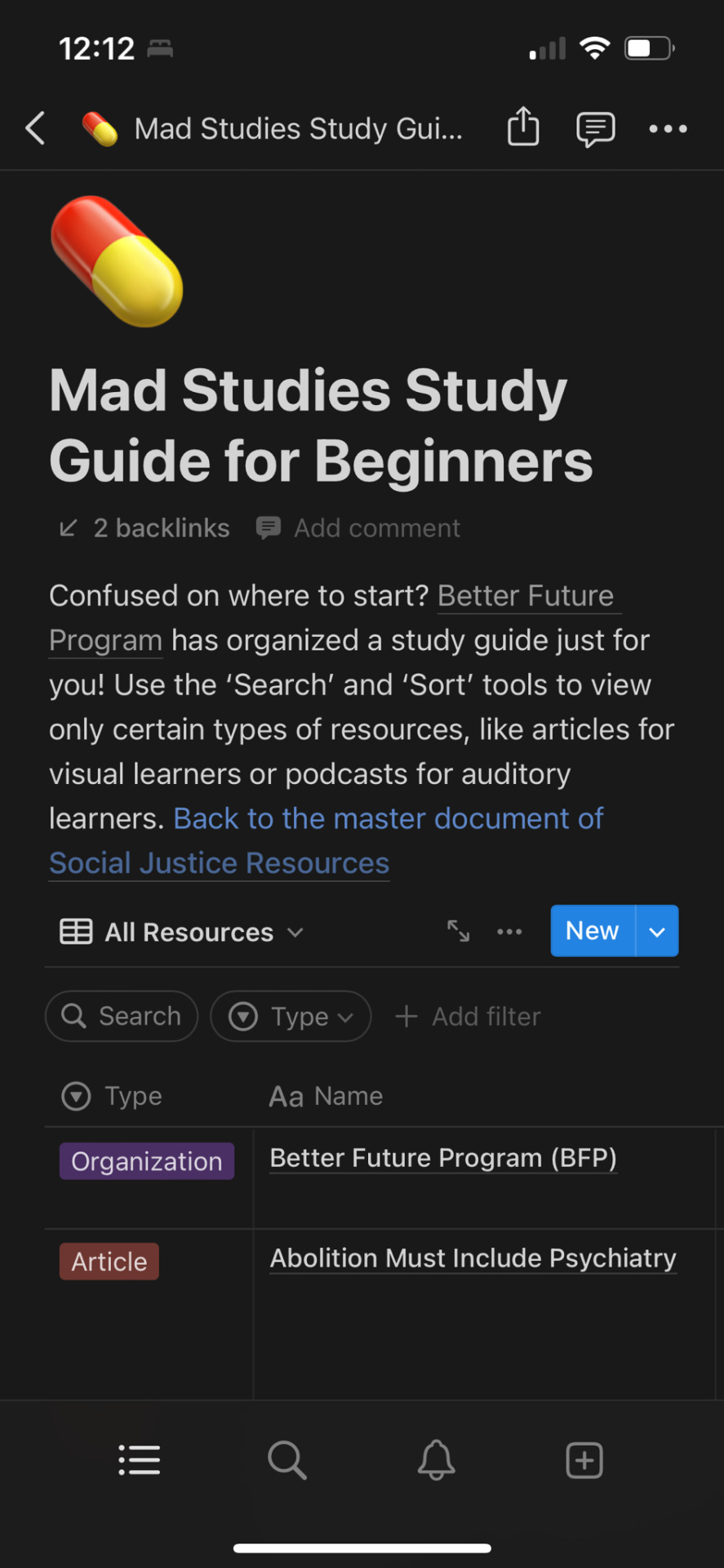
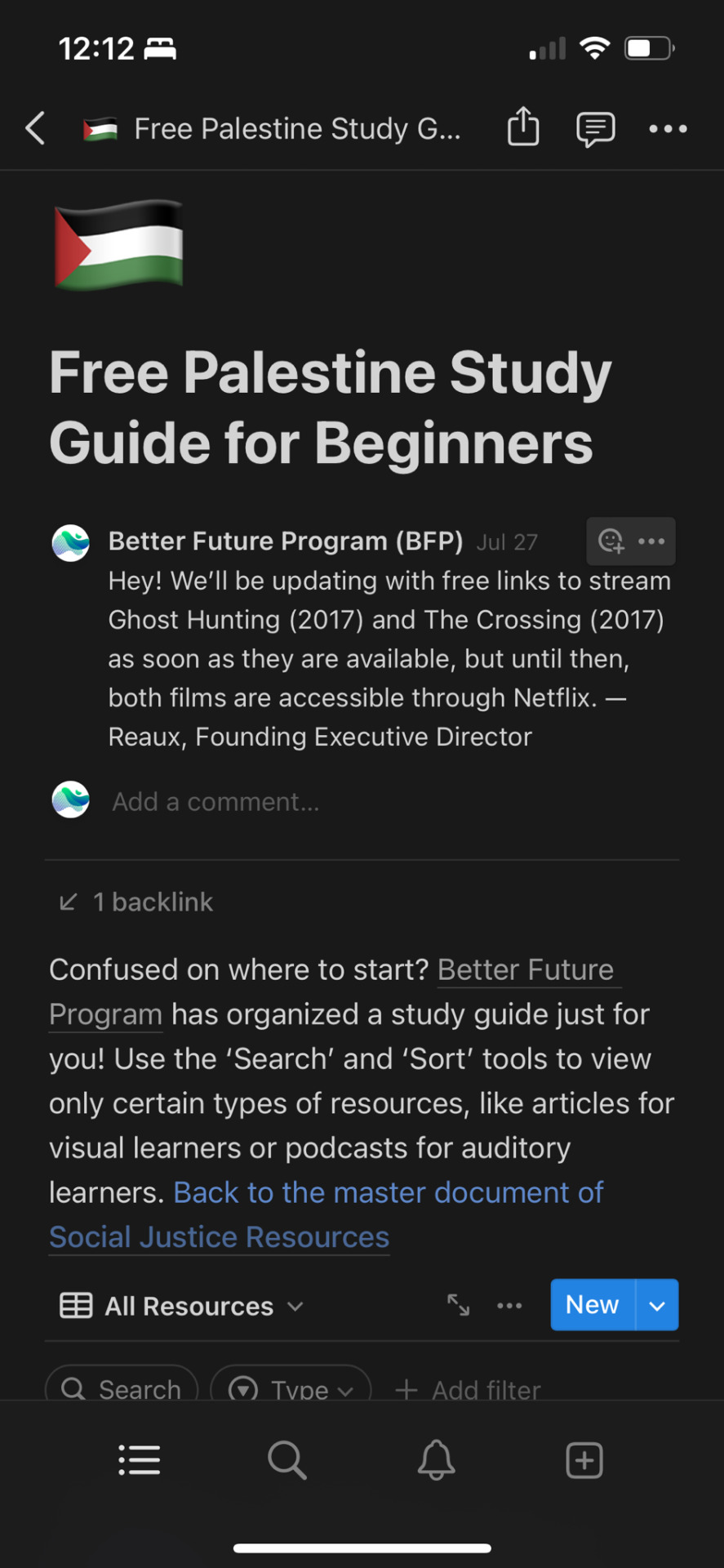
just wanted to remind everyone again not only of the 3,000+ resources offered through our Liberation Library but also of the study guides for beginners offered under each of our social justice topics!
resources can be organized by type (article, novel, podcast, video, etc.) as well as filtered and searched through. we’ve tried to make our system much more accessible than our former platform on google docs so this is such an exciting development to share with everyone.
please share to promote equitable access education!and if you’d like to volunteer with us, check out our open resources committee roles!
REBLOG THIS VERSION! image description by @bonesandblood-sunandmoon below the cut. thank you for writing one!
[Image Description: Six screenshots of beginner study guides on mobile view. The main text visible under each title reads:
Confused on where to start? Better Future Program has organized a study guide just for you! Use the ‘Search’ and ‘Sort’ tools to view only certain types of resources, like articles for visual learners or podcasts for auditory learners. Back to the master document of Social Justice Resources.
Five of the study guides have the start of a list of resources available with color coded resource types visible - Posts have a purple box, for example. Each study guide has an image. Prison/Policing Abolition has an image of chains, Organizing has two humanoid figures hugging, Classism and Anti-Capitalism has a stack of dollar bills, Anarchism has the red ‘A’ in a circle, Mad Studies has a yellow and orange capsule/pill, and Free Palestine has the flag of Palestine.
/End description.]
#reaux speaks#resources#educational equity#abolition#organizing#anti capitalism#anarchism#palestine#mad liberation#free palestine#israel
18K notes
·
View notes
Text
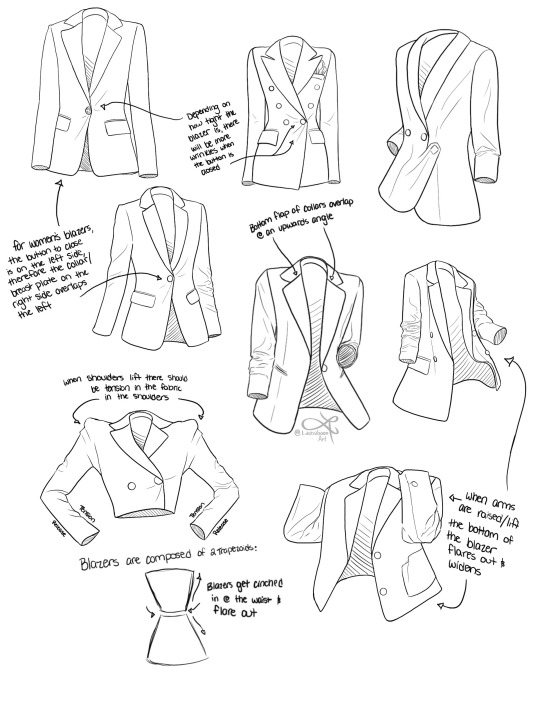
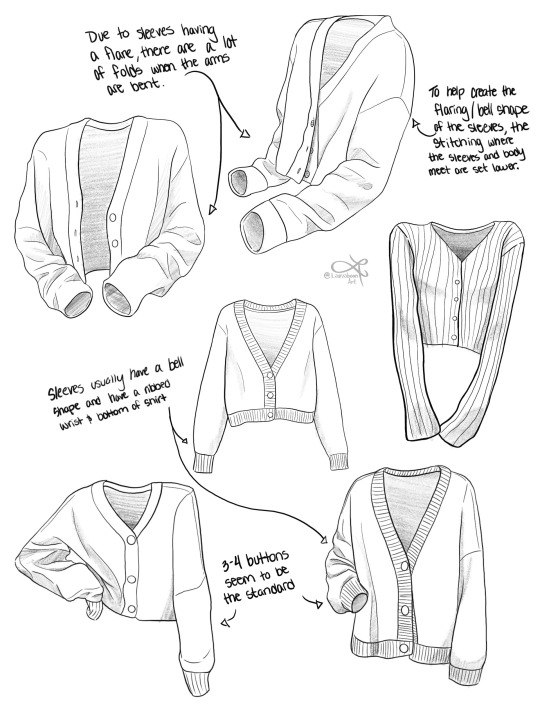
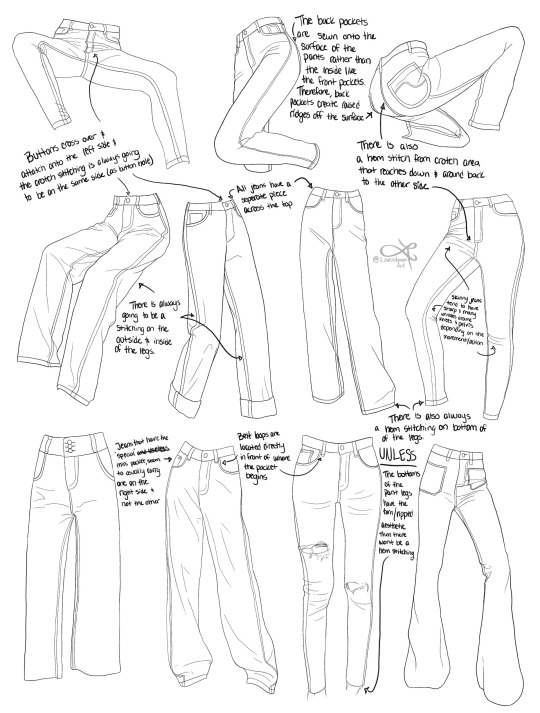
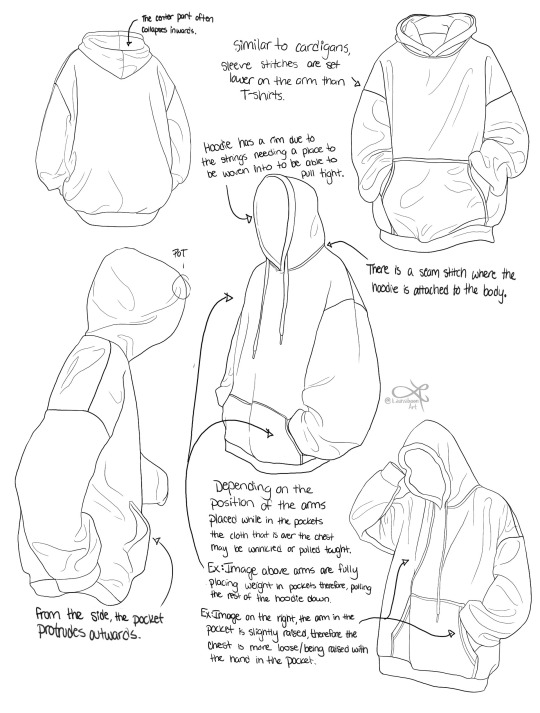
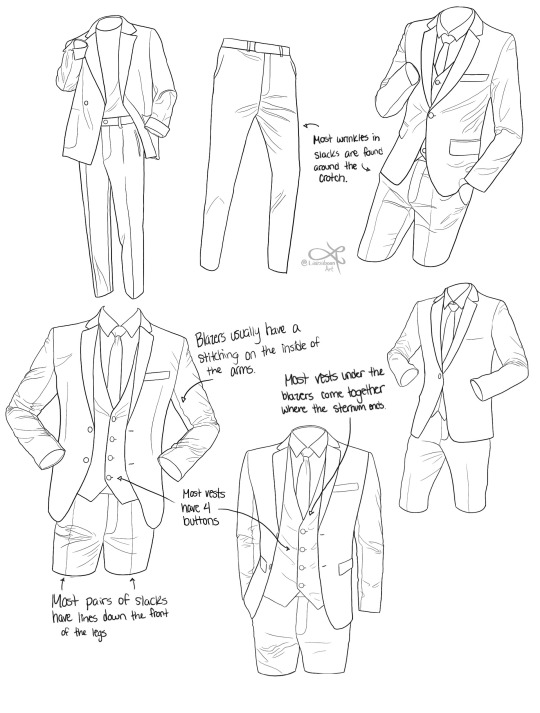
I'm currently doing an online art school program and I thought I'd share some notes on clothing pieces for anyone else whose like me and for some reason can't understand objects with free from lol I hope you find some of these observations/ notes useful for any of your art journeys!
#art reference#reference#art tutorial#art tips#art resources#art advice#drawing tips#drawing reference#clothing reference#how to draw clothes#drawing#how to draw#drawing tutorial#art education#art help#clothing#fashion drawing#art school#artists on tumblr#art community#art study
19K notes
·
View notes
Text
Deprivation versus Education
Photo by Khalil on Unsplash
On Tuesday, around half-past-nine in the morning, my cat jumped onto the sink. An instant after I turned the tap, the power went out. Cue a three-day saga of landlord, electricians and plumbers clumping past my workspace and accusing glares from Teddy, the cat, as he nosed the unyielding tap.
Serendipitously, my three dry days coincided with reading from George…

View On WordPress
0 notes
Text
Fantasy Guide to Education

I'm always asked what sort of education different people recieve throughout different historical eras and since I'm heading back to college soon, I thought it was high time I made this guide.
Disparity


Education is viewed as a right by many but for some and thoughout history it was a privilege. For the wealthy and those of high status, education can be easily accessed. They can afford to tailor an education to fit their needs, they can hire tutors, and they can afford tuitions to top schools. For the poor, education was a luxury. However this doesn't mean that it was available. Some communities would fund a school or send their children to a local teacher - usually they had to pay a daily fee or at least bring kindling for the heating. Many poorer children also worked so they could not attend school consistently or were pulled out very early into their education. However, some poorer students could gain access to high level education if they were extremely bright or caught the attention of a wealthy benefactor who could fund their education.
Education as a Weapon

Education could also be banned for certain groups in society. It could be illegal to fund schools or host gatherings for students of a certain background, race, religion or gender. Education against the law could be punished by imprisonment, exile or execution. This is a measure usually taken by oppressive governments in order to follow a moral code or restrict the betterment of a certain group. An example would be the Irish Catholics under the Penal Laws.
On the otherhand, there is education that is influenced by the state to inject certain values, moralities and Opinions into a population. This is the intense restriction of reading material, removal of books that contest the teachings of the government or the kidnap of children from their culture, in order to forcibly educated them in alignment to their beliefs. An example would be the residental schools of North America and Canada and the AHS schools of Nazi Germany.
Content

As above, content of what children learn usually falls into a certain category. This is also true for the education offered to the wealthy and the poor. The poor would be offered a basic education, learning literacy and arithmetic, usually with an expectation that the children would not go on to any jobs that needs a broader education. Any higher education would be hard to obtain because of cost and the discriminatory view of the enrollment panels. The wealthy would have access to an array of different subjects including: The arts (drawing, music, painting, poetry, dancing), sports (riding, martial skills, rowing, hunting), arithmetic, geography, languages, geography and history. While progression to higher education will still be difficult, any affluent families are legacies of prestigious colleges or can make a donation to grease a few palms. These schools would be where the wealthy make lifelong connections and get springboarded toward opportunities.
Private Tutoring

Whilst some affluent, aristocratic and Royal families send their children to schools, private tutoring in the home was a popular choice. Children would be educated at home but tutors who either lived in the home or come to the house. The children would be educated alongside siblings or the children of courtiers or neighbours. Private tutoring sessions would often be the only education for upper class women recieved, taught by governesses and tutors.
Premises and Equipment

As mentioned above, wealthy and aristocratic families would usually attend established schools or attend school at home. They would be provided any equipment they needed. If they attend school, they would often wear a uniform. Some schools had multiple variations of the uniform for different activities. Many of the schools attended would be boarding schools. Boarding schools offered education to those who boarded and day students, however day students were often looked down upon as lesser than.
Poorer schools would be relient on donations and fees paid by students. As mentioned above, there may be a building reserved for classes - sometimes an designated schoolhouse or a teacher's home or a public building such as a gathering house or sometimes even outside - hedge schools. Equipment would be provided by the school. Uniforms at poorer schools were not a thing but students were expected to show up neat and tidy.
Corporal Punishment

Corporal punishment at schools was the go to punishment for students. Teachers had free rein to strike children for mistakes and bad behaviour. Punishments include insolation, physical stress positions such as standing on a chair all day, getting objects thrown at them, being slapped on the back of the legs with a cane, being rapped on the palms or knuckles with a crop or ruler. Students may also be humiliated by teachers through the use of dunce hats, encouraging other children to bully them or by the use of verbal abuse. Corporal punishment did extend to all classes except for royal children since that was either taken by proxy by whipping boys or left up to parents.
#Fantasy Guide to Education#Fantasy Guide#writing#writeblr#writing resources#writing reference#writing advice#writer#spilled words#writers#Writer's research#Writer's resources#Writer's reference#writer's problems#Writing help#Writing resources writing reference#Writing reference writing resources
796 notes
·
View notes
Text
*tries to organize my thoughts*
*remembers i'm not in school and therefore beholden to neither heaven nor hell nor any man's grading system*
*joyously shredding & tossing all my carefully arranged 3x5 mental notecards into the air like so much beige confetti. raising my arms in victory, cheering raucously until i accidentally inhale bits of homemade confetti*
(*coughing up itty bits of paper like a cat evicting a hairball with a firm understanding of tenants' rights*) wait wat happens next
#i marie kondoed my thoughts and *i* feel great. but now my stream-of-consciousness has escaped containment#so many innocent bystanders at stake#every time i try to organize my thoughts i run out of plastic bins and have to make a trip to the container store where i get even more dis#racted so. you can't just hand me THIS brain and NO catalogue OR library classification system#and expect me to single-handedly sort through all this nonsense? bad form but fucking form not in my job description#aNYways. formal education sure did a FUCKING NUMBER on us huh#(a number i measure not in gpa or dollars of student debt.#but in the number of therapy sessions & medical debt it will take to recover.)#seriously folks. our education systems are...innately traumatizing for a huge number of students. and we NEED to address this.#the fact that it is culturally common for adults to have anxiety nightmares about school/exams...even decades later?#that is not cute. it is Alarming.#no one--much less entire generations--should be spending their developmental years in an environment of chronic stress & pressure & strain#and yet that is the reality for millions and millions of pre-teen and teenage and young adult students#this isn't healthy and it serves and empowers NO ONE#...except of course the many exploitative educational & financial & debt-collecting institutions thriving from the current balance of power#and of course it's a nefarious and powerful way to sabotage/erase the middle class#which billionaires and the wealth-inequality creators they finance couldn't possibly have any noteworthy interest in whatsoever#it's not like there's an elite group of people with huge financial incentives to drain/steal resources from the masses...#anyways sorry for going all Conspiracy Theory on you.#obviously the billionaires who control the vast majority of our resources and news and political campaign funding#are not tied to every single itty bitty social issue and i'm a silly billy to imply it#please tell elon musk to ignore this tweet i am so subservient and acquiescent#mr musky u r so good at inheriting slavery-built mining fortunes & buying other people's companies#& building rocket ships & fancy cars that do NOT explode/catch fire & also NOT running billion dollar companies into the ground#mr musky u r so talented genius billionaire playboy with 10 kids and ex-wives who find you creepy af babe u r basically iron man
2K notes
·
View notes
Text
DEAR EDUCATIONALLY NEGLECTED HOMESCHOOLERS
I’ve gathered some resources and tips and tricks on self-educating after educational neglect. This is only what I did and what I know helped me. I’m about to graduate college with honors after having no education past the age of 9. I wouldn’t be here without the following. Everything is free, and at/well above the standard for education in the US.
The holy grail: Khan Academy. Nearly every course you could take is available here, in order and by grade level. Their open-source free courses rival some of the college classes I’ve taken. This is your most solid resource.
For inattentive types: Crash Course offers a variety of courses that are snappy, entertaining, and extremely rewarding. They work for my ADHD brain. They also have college prep advice, which is essential if you’re looking to go to higher education with no classroom experience.
To catch up on your reading: There are certain books that you may have read had you gone to school that you’ve missed out on. This list is the most well-rounded and can fill you in on both children’s books and classic novels that are essential or at least extremely helpful to be familiar with. You can find a majority of these easily at a local library (and some for free in PDF form online low key). There are a few higher level classics in here that I’d highly recommend. If it doesn’t work for you, I’d always recommend asking your local librarian.
*BE AWARE* The book list I recommend suggests you read Harry Potter books, and given their transphobic author you may or may not want to read them. If you choose to, I’d highly recommend buying the books secondhand or borrowing from a library to avoid financially supporting a living author with dangerous and damaging views.
TEST, TEST, TEST: Again, Khan Academy is your go-to for this. I don’t personally like standardized testing, but going through SAT and ACT courses was the best way I found to really reveal my gaps so that I could supplement.
Finally: As much as you can, enjoy the process. Education can be thrilling and teach you so much about yourself, and help shape your view of the world. It can get frustrating, but I’d like to encourage you that everyone can learn. No pace is the perfect pace, and your learning style is the right learning style for you. In teaching yourself, be patient, be kind, and indulge in the subjects you really enjoy without neglecting others. You are your teacher. Give yourself what others chose not to.
#if you have any questions please don’t hesitate to message me anything#I’ll help however I can#homeschool#ex fundamentalist#ex homeschool#ex homeschooled#educational neglect#education#self education#ex fundie#send me asks#homeschool recovery#resources#educate yourself#ex christian#exvangelical#religious trauma#tw religion#deconstructing christianity
6K notes
·
View notes
Text
The Disability Library
I love books, I love literature, and I love this blog, but it's only been recently that I've really been given the option to explore disabled literature, and I hate that. When I was a kid, all I wanted was to be able to read about characters like me, and now as an adult, all I want is to be able to read a book that takes us seriously.
And so, friends, Romans, countrymen, I present, a special disability and chronic illness booklist, compiled by myself and through the contributions of wonderful members from this site!
As always, if there are any at all that you want me to add, please just say. I'm always looking for more!
Edit 20/10/2023: You can now suggest books using the google form at the bottom!
Updated: 31/08/2023
Articles and Chapters
The Drifting Language of Architectural Accessibility in Victor Hugo's Notre-Dame de Paris, Essaka Joshua, 2012
Early Modern Literature and Disability Studies, Allison P. Hobgood, David Houston Wood, 2017
How Do You Develop Whole Object Relations as an Adult?, Elinor Greenburg, 2019
Making Do with What You Don't Have: Disabled Black Motherhood in Octavia E. Butler's Parable of the Sower and Parable of the Talents, Anna Hinton, 2018
Necropolitics, Achille Mbeme, 2003 OR Necropolitics, Achille Mbeme, 2019
Wasted Lives: Modernity and Its Outcasts, Zygmunt Bauman, 2004
Witchcraft and deformity in early modern English Literature, Scott Eaton, 2020
Books
Fiction:
Misc:
10 Things I Can See From Here, Carrie Mac
A-F:
A Curse So Dark and Lonely, (Series), Brigid Kemmerer
Akata Witch, (Series), Nnedi Okorafor
A Mango-Shaped Space, Wendy Mass
Ancillary Justice, (Series), Ann Leckie
An Unkindness of Ghosts, Rivers Solomon
An Unseen Attraction, (Series), K. J. Charles
A Shot in the Dark, Victoria Lee
A Snicker of Magic, Natalie Lloyd
A Song of Ice and Fire, (series), George R. R. Martin
A Spindle Splintered, (Series), Alix E. Harrow
A Time to Dance, Padma Venkatraman
Bath Haus, P. J. Vernon
Beasts of Prey, (Series), Ayana Gray
The Bedlam Stacks, (Series), Natasha Pulley
Black Bird, Blue Road, Sofiya Pasternack
Black Sun, (Series), Rebecca Roanhorse
Blood Price, (Series), Tanya Huff
Borderline, (Series), Mishell Baker
Breath, Donna Jo Napoli
The Broken Kingdoms, (Series), N.K. Jemisin
Brute, Kim Fielding
Cafe con Lychee, Emery Lee
Carry the Ocean, (Series), Heidi Cullinan
Challenger Deep, Neal Shusterman
Cinder, (Series), Marissa Meyer
Clean, Amy Reed
Connection Error, (Series), Annabeth Albert
Cosima Unfortunate Steals A Star, Laura Noakes
Crazy, Benjamin Lebert
Crooked Kingdom, (Series), Leigh Bardugo
Daniel Cabot Puts Down Roots, (Series), Cat Sebastian
Daniel, Deconstructed, James Ramos
Dead in the Garden, (Series), Dahlia Donovan
Dear Fang, With Love, Rufi Thorpe
Deathless Divide, (Series), Justina Ireland
The Degenerates, J. Albert Mann
The Doctor's Discretion, E.E. Ottoman
Earth Girl, (Series), Janet Edwards
Everyone in This Room Will Someday Be Dead, Emily R. Austin
The Extraordinaries, (Series), T. J. Klune
The Extraordinary Education of Nicholas Benedict, (Series), Trenton Lee Stewart
Fight + Flight, Jules Machias
The Final Girl Support Group, Grady Hendrix
Finding My Voice, (Series), Aoife Dooley
The First Thing About You, Chaz Hayden
Follow My Leader, James B. Garfield
Forever Is Now, Mariama J. Lockington
Fortune Favours the Dead, (Series), Stephen Spotswood
Fresh, Margot Wood
H-0:
Harmony, London Price
Harrow the Ninth, (series), Tamsyn Muir
Hench, (Series), Natalia Zina Walschots
Highly Illogical Behaviour, John Corey Whaley
Honey Girl, Morgan Rogers
How to Become a Planet, Nicole Melleby
How to Bite Your Neighbor and Win a Wager, (Series), D. N. Bryn
How to Sell Your Blood & Fall in Love, (Series), D. N. Bryn
Hunger Pangs: True Love Bites, Joy Demorra
I Am Not Alone, Francisco X. Stork
The Immeasurable Depth of You, Maria Ingrande Mora
In the Ring, Sierra Isley
Into The Drowning Deep, (Series), Mira Grant
Iron Widow, (Series), Xiran Jay Zhao
Izzy at the End of the World, K. A. Reynolds
Jodie's Journey, Colin Thiele
Just by Looking at Him, Ryan O'Connell
Kissing Doorknobs, Terry Spencer Hesser
Lakelore, Anna-Marie McLemore
Learning Curves, (Series), Ceillie Simkiss
Let's Call It a Doomsday, Katie Henry
The Library of the Dead, (Series), TL Huchu
The Lion Hunter, (Series), Elizabeth Wein
Lirael, (Series), Garth Nix
Long Macchiatos and Monsters, Alison Evans
Love from A to Z, (Series), S.K. Ali
Lycanthropy and Other Chronic Illnesses, Kristen O'Neal
Never Let Me Go, Kazuo Ishiguro
The Never Tilting World, (Series), Rin Chupeco
The No-Girlfriend Rule, Christen Randall
Nona the Ninth, (series), Tamsyn Muir
Noor, Nnedi Okorafor
Odder Still, (Series), D. N. Bryn
Once Stolen, (Series), D. N. Bryn
One For All, Lillie Lainoff
On the Edge of Gone, Corinne Duyvis
Origami Striptease, Peggy Munson
Our Bloody Pearl, (Series), D. N. Bryn
Out of My Mind, Sharon M. Draper
P-T:
Parable of the Sower, (Series), Octavia E. Butler
Parable of the Talents, (Series), Octavia E. Butler
Percy Jackson & the Olympians, (series), Rick Riordan
Pomegranate, Helen Elaine Lee
The Prey of Gods, Nicky Drayden
The Pursuit Of..., (Series), Courtney Milan
The Queen's Thief, (Series), Megan Whalen Turner
The Quiet and the Loud, Helena Fox
The Raging Quiet, Sheryl Jordan
The Reanimator's Heart, (Series), Kara Jorgensen
The Remaking of Corbin Wale, Joan Parrish
Roll with It, (Series), Jamie Sumner
Russian Doll, (Series), Cristelle Comby
The Second Mango, (Series), Shira Glassman
Scar of the Bamboo Leaf, Sieni A.M
Shaman, (Series), Noah Gordon
Sick Kids in Love, Hannah Moskowitz
The Silent Boy, Lois Lowry
Six of Crows, (Series) Leigh Bardugo
Sizzle Reel, Carlyn Greenwald
The Spare Man, Mary Robinette Kowal
The Stagsblood Prince, (Series), Gideon E. Wood
Stake Sauce, Arc 1: The Secret Ingredient is Love. No, Really, (Series), RoAnna Sylver
Stars in Your Eyes, Kacen Callender [Expected release: Oct 2023]
The Storm Runner, (Series), J. C. Cervantes
Stronger Still, (Series), D. N. Bryn
Sweetblood, Pete Hautman
Tarnished Are the Stars, Rosiee Thor
The Theft of Sunlight, (Series), Intisar Khanani
Throwaway Girls, Andrea Contos
Top Ten, Katie Cotugno
Torch, Lyn Miller-Lachmann
Treasure, Rebekah Weatherspoon
Turtles All the Way Down, John Green
U-Z:
Unlicensed Delivery, Will Soulsby-McCreath
Expected release October 2023
Verona Comics, Jennifer Dugan
Vorkosigan Saga, (Series), Lois McMaster Bujold
We Are the Ants, (Series), Shaun David Hutchinson
The Weight of Our Sky, Hanna Alkaf
Whip, Stir and Serve, Caitlyn Frost and Henry Drake
The Whispering Dark, Kelly Andrew
Wicked Sweet, Chelsea M. Cameron
Wonder, (Series), R. J. Palacio
Wrong to Need You, (Series), Alisha Rai
Ziggy, Stardust and Me, James Brandon
Graphic Novels:
A Quick & Easy Guide to Sex & Disability, (Non-Fiction), A. Andrews
Constellations, Kate Glasheen
Dancing After TEN: a graphic memoir, (memoir) (Non-Fiction), Vivian Chong, Georgia Webber
Everything Is an Emergency: An OCD Story in Words Pictures, (memoir) (Non-Fiction), Jason Adam Katzenstein
Frankie's World: A Graphic Novel, (Series), Aoife Dooley
The Golden Hour, Niki Smith
Nimona, N. D. Stevenson
The Third Person, (memoir) (Non-Fiction), Emma Grove
Magazines and Anthologies:
Artificial Divide, (Anthology), Robert Kingett, Randy Lacey
Beneath Ceaseless Skies #175: Grandmother-nai-Leylit's Cloth of Winds, (Article), R. B. Lemburg
Defying Doomsday, (Anthology), edited by Tsana Dolichva and Holly Kench
Josee, the Tiger and the Fish, (short story) (anthology), Seiko Tanabe
Nothing Without Us, edited by Cait Gordon and Talia C. Johnson
Nothing Without Us Too, edited by Cait Gordon and Talia C. Johnson
Unbroken: 13 Stories Starring Disabled Teens, (Anthology), edited by Marieke Nijkamp
Uncanny #24: Disabled People Destroy Science Fiction, (Anthology), edited by: Elsa Sjunneson-Henry, Dominik Parisien et al.
Uncanny #30: Disabled People Destroy Fantasy, (Anthology), edited by: Nicolette Barischoff, Lisa M. Bradley, Katharine Duckett
We Shall Be Monsters, edited by Derek Newman-Stille
Manga:
Perfect World, (Series), Rie Aruga
The Sky is Blue with a Single Cloud, (Short Stories), Kuniko Tsurita
Non-Fiction:
Academic Ableism: Disability and Higher Education, Jay Timothy Dolmage
A Disability History of the United States, Kim E, Nielsen
The Architecture of Disability: Buildings, Cities, and Landscapes beyond Access, David Gissen
Being Seen: One Deafblind Woman's Fight to End Ableism, Elsa Sjunneson
Black Disability Politics, Sami Schalk
Borderline, Narcissistic, and Schizoid Adaptations: The Pursuit of Love, Admiration, and Safety, Dr. Elinor Greenburg
Brilliant Imperfection: Grappling with Cure, Eli Clare
The Cambridge Companion to Literature and Disability, Barker, Clare and Stuart Murray, editors.
The Capacity Contract: Intellectual Disability and the Question of Citizenship, Stacy Clifford Simplican
Capitalism and Disability, Martha Russel
Care work: Dreaming Disability Justice, Leah Lakshmi Piepzna-Samarasinha
Catatonia, Shutdown and Breakdown in Autism: A Psycho-Ecological Approach, Dr Amitta Shah
The Collected Schizophrenias: Essays, Esme Weijun Wang
Crip Kinship, Shayda Kafai
Crip Up the Kitchen: Tools, Tips and Recipes for the Disabled Cook, Jules Sherred
Culture – Theory – Disability: Encounters between Disability Studies and Cultural Studies, Anne Waldschmidt, Hanjo Berressem, Moritz Ingwersen
Decarcerating Disability: Deinstitutionalization and Prison Abolition, Liat Ben-Moshe
Demystifying Disability: What to Know, What to Say, and How to Be an Ally, Emily Ladau
Dirty River: A Queer Femme of Color Dreaming Her Way Home, Leah Lakshmi Piepzna-Samarasinha
Disability Pride: Dispatches from a Post-ADA World, Ben Mattlin
Disability Visibility: First-Person Stories From the Twenty-First Century, Alice Wong
Disfigured: On Fairy Tales, Disability and Making Space, Amanda Leduc
Every Cripple a Superhero, Christoph Keller
Exile and Pride: Disability, Queerness and Liberation, Eli Clare
Feminist Queer Crip, Alison Kafer
The Future Is Disabled: Prophecies, Love Notes, and Mourning Songs, Leah Lakshmi Piepzna-Samarasinha
Growing Up Disabled in Australia, Carly Findlay
It's Just Nerves: Notes on a Disability, Kelly Davio
The Immortal Life of Henrietta Lacks, Rebecca Skloot
Language Deprivation & Deaf Mental Health, Neil S. Glickman, Wyatte C. Hall
The Minority Body: A Theory of Disability, Elizabeth Barnes
My Body and Other Crumbling Empires: Lessons for Healing in a World That Is Sick, Lyndsey Medford
No Right to Be Idle: The Invention of Disability, 1840s-1930s, Sarah F. Rose
Nothing About Us Without Us: Disability Oppression and Empowerment, James I. Charlton
The Pedagogy of Pathologization Dis/abled Girls of Color in the School-prison Nexus, Subini Ancy Annamma
Physical Disability in British Romantic Literature, Essaka Joshua
QDA: A Queer Disability Anthology, Raymond Luczak, Editor.
The Right to Maim: Debility, Capacity, Disability, Jasbir K. Puar
Sitting Pretty, (memoir), Rebecca Taussig
Sounds Like Home: Growing Up Black & Deaf in the South, Mary Herring Wright
Surviving and Thriving with an Invisible Chronic Illness: How to Stay Sane and Live One Step Ahead of Your Symptoms, Ilana Jacqueline
The Things We Don't Say: An Anthology of Chronic Illness Truths, Julie Morgenlender
Uncanny Bodies: Superhero Comics and Disability, Scott T. Smith, José Alaniz
Uncomfortable Labels: My Life as a Gay Autistic Trans Woman, (memoir), Laura Kate Dale
Unmasking Autism, Devon Price
The War on Disabled People: Capitalism, Welfare and the Making of a Human Catastrophe, Ellen Clifford
We've Got This: Essays by Disabled Parents, Eliza Hull
Year of the Tiger: An Activist's Life, (memoir) (essays) Alice Wong
Picture Books:
A Day With No Words, Tiffany Hammond, Kate Cosgrove-
A Friend for Henry, Jenn Bailey, Mika Song
Ali and the Sea Stars, Ali Stroker, Gillian Reid
All Are Welcome, Alexandra Penfold, Suzanne Kaufman
All the Way to the Top, Annette Bay Pimentel, Jennifer Keelan-Chaffins, Nabi Ali
Can Bears Ski?, Raymond Antrobus, Polly Dunbar
Different -- A Great Thing to Be!, Heather Alvis, Sarah Mensinga
Everyone Belongs, Heather Alvis, Sarah Mensinga
I Talk Like a River, Jordan Scott, Sydney Smith
Jubilee: The First Therapy Horse and an Olympic Dream, K. T. Johnson, Anabella Ortiz
Just Ask!, Sonia Sotomayor, Rafael López
Kami and the Yaks, Andrea Stenn Stryer, Bert Dodson
My Three Best Friends and Me, Zulay, Cari Best, Vanessa Brantley-Newton
Rescue & Jessica: A Life-Changing Friendship, Jessica Kensky, Patrick Downes, Scott Magoon
Sam's Super Seats, Keah Brown, Sharee Miller
Small Knight and the Anxiety Monster, Manka Kasha
We Move Together, Kelly Fritsch, Anne McGuire, Eduardo Trejos
We're Different, We're the Same, and We're All Wonderful!, Bobbi Jane Kates, Joe Mathieu
What Happened to You?, James Catchpole, Karen George
The World Needs More Purple People, Kristen Bell, Benjamin Hart, Daniel Wiseman
You Are Enough: A Book About Inclusion, Margaret O'Hair, Sofia Sanchez, Sofia Cardoso
You Are Loved: A Book About Families, Margaret O'Hair, Sofia Sanchez, Sofia Cardoso
The You Kind of Kind, Nina West, Hayden Evans
Zoom!, Robert Munsch, Michael Martchenko
Plays:
Peeling, Kate O'Reilly
---
With an extra special thank you to @parafoxicalk @craftybookworms @lunod @galaxyaroace @shub-s @trans-axolotl @suspicious-whumping-egg @ya-world-challenge @fictionalgirlsworld @rubyjewelqueen @some-weird-queer-writer @jacensolodjo @cherry-sys @dralthon @thebibliosphere @brynwrites @aj-grimoire @shade-and-sun @ceanothusspinosus @edhelwen1 @waltzofthewifi @spiderleggedhorse @sleepneverheardofher @highladyluck @oftheides @thecouragetobekind @nopoodles @lupadracolis @elusivemellifluence @creativiteaa @moonflowero1 @the-bi-library @chronically-chaotic-cryptid for your absolutely fantastic contributions!
---
Submit a Book:
#disability resources#disability#chronic illness#disability books#books#resources#book list#disability literature#literature#disability representation#disabled characters#information#informative#disability education#disability history#disability rights#please add to this#to be updated#long post
2K notes
·
View notes
Text
Fit&Well Natural Health
Fit&Well Natural Health
Welcome to Fit&Well Natural Health! We provide countless offers, and ‘must-haves’ for health that many visitors find quite impressive, and all in one place. Our visitors get convenient access to products and information that we believe are literally daily life essentials. Not only do we promote health and wellness, but also lot’s of other necessities of life. For example, categories such as…

View On WordPress
#best herbal blends#best online herb school#best vapes#clothing#education resources#family oriented#health and wellness#kids#men&039;s health#natural health products#one stop shop#online mall#shopping#side hustles#women&039;s health#work from home
0 notes
Text
Someone created a Master Document for Palestine, the Democratic Republic of Congo (DRC), Sudan, Haiti, Yemen, and Hawai'i full of relevant accounts to follow, legitimate causes to donate to, and information on their current situations. OP also plans to keep this doc updated and include additional countries, so you can check it periodically for new details. This is a great resource to help educate yourself and help share information!
#palestine#gaza#free palestine#democratic republic of the congo#congo#free congo#sudan#free sudan#haiti#free haiti#yemen#free yemen#hawai'i#resources#to read#sharing information is very important but so is educating yourself on these topics
307 notes
·
View notes
Text
Language resources
(Duolingo alternatives)
For those who no longer use or trust Duolingo, I've put together a list of resources - apps, learning methods, programmes, etc - with a list of whether or not they are free, and my personal experience with their success at teaching a language. I have also included new ones that I haven't tried yet but which I have researched; for these, I have included a rating of how much hope I have for them panning out in the future.
[I grew up bilingual & went to a multicultural school that had a student body consisting of children from refugee families who spoke little to no English. The school prioritised teaching the entire student body the minority languages, and finding a bridge language we could all learn together to fill in any gaps in communication. Due to this, I spent the last 4 years of primary school learning new languages with the rest of the student body.
We would have a school-wide lesson for 1 hour once a week - usually with a child or staff member fluent in that language leading the lesson at the front of the gym with a microphone so we could hear the correct pronunciation in time with reading the native spelling & English phonetics on the projector screen at the front of the hall. We were expected to use this language in the corridors when we spoke with teachers or staff members and when we passed by other students regardless of what their or our native languages were. As far as fluency went, we were expected to be able to recognise and say greetings and goodbyes, enquire to each others well-being, know how to ask for assistance, how to ask for medical help for various things, how to ask where the bathroom was, to give and receive directions around the entire school, as well as colours, names of things found around the school, make small talk about our activities of the day and our family, and why we were out of class - all with relative ease & mutual understanding.
We changed language after every break, so it was roughly 8 hours of lessons in each language, before we would start again with a new one.
Alongside this, the older students in the school (final 3 years, aged 9 - 11/12) would learn French 3+ hours a week for those 3 years so their writing, reading and speaking standards were acceptable for the beginning of high school. In 1 of these years, we also studied both of our native languages for the first time, for 6 weeks each.
I left traditional schooling at 11, and while I was home-schooled I taught myself Italian, Russian, and Latin from scratch, along with relearning my preferred native language, and 2 forms of sign - I used Makaton as a young child and in school as I have a form of mutism, but as a teen I realised I associated this language with the severe trauma I experienced at school, and so suffered from flashbacks and dissociative episodes when I used it. This, along with medical concerns, led to me learning BSL, and then SSE. Today, I use a combination of English, SSE and my native language in everyday settings. I have a mental block for learning French due to it being heavily associated with my trauma.
I am saying all this not for sympathy, but so that you can see firstly how much I enjoy and value learning languages, and in order to show my experience levels with learning languages. I've used, tried, and tested all of the learning methods I will be talking about in this post. I have either used or done a lot of research into the apps and programmes discussed in this post.
And yes, I have prioritised ones that teach endangered languages, indigenous languages and languages that aren't often included in language media such as Hebrew, various forms of Arabic, Navajo, Gaelic, and others. I have also included ones that teach and / or document sign languages and sign communication systems.]
Please note that the following lists are arranged in no particular order. They are not ranked best to worst or by any other X to Y ratio. They are simply ranked according to how I remembered, tested, or found each of them.
Apps
1: Fluyo.
Rating for hope / faith: ☆☆☆☆☆
Languages available: ☆☆☆
Effectiveness: n/a
Cost: unknown
Status: not yet publicly available
Please note that while Fluyo is not yet available, its Kickstarter page is flourishing, its app is in development, and the developer is a man of colour who has continued to devote himself to this app and its development despite rising health concerns, developing a life-changing disabling condition, and numerous set-backs. His YouTube channel is very educational, and he has also written a book on language-learning. If you would like to know more, you can learn about him here. Fluyo is set up like a computer game with multiple cute characters who are interactive rather than stationary, and I genuinely have high hopes for it once it is released.
2: Babble
Personal experience: ☆☆☆
Languages available: ☆☆
Effectiveness: ☆☆☆☆
Cost: free trial for the first lesson, but a paid subscription is required for any further lessons
Status: available to download
3: Language Drops
Personal experience: ☆☆
Languages available: ☆☆☆☆☆
Effectiveness: ☆☆☆
Cost: free for some lessons, but a paid account is required for access to all lessons
Status: available to download
4: Fluent forever
Hope for: ☆☆☆☆
Languages available: ☆☆☆☆
Effectiveness: ☆☆☆☆☆
Cost: free access to basic lessons to build your confidence with the language, but a paid subscription is required for unlimited access
Status: available to download
5: Lingopie
Hope for: ☆☆☆☆☆
Languages available: ☆☆
Effectiveness: ☆☆☆☆☆
Cost: free trial for 7 days, but a paid subscription is required after that for continued use of the app
Status: available to download
6: Fluenday
Hope for: ☆☆☆
Languages available: ☆☆
Effectiveness: ☆☆☆☆
Cost: free
Status: available to download
7: Language flower
Hope for: ☆
Languages available: ☆
Effectiveness: ☆☆
Cost: free, as far as I can tell
Status: available to download
8: Sign BSL / Daniel Mitchell
Personal experience: ☆☆☆☆
Languages available: ☆☆☆☆☆
Effectiveness: ☆☆☆☆
Cost: free
Status: available to download
Please note that Daniel Mitchel offers a BSL version of this, along with an ASL version.
9: Bright BSL / sign lab
Personal experience: ☆☆☆
Languages available: ☆☆☆☆☆
Effectiveness:☆☆☆☆
Cost: free for some lessons + premium for all other lessons
Status: available to download
Please note that Sign Lab offers this app for the following sign languages: BSL (Bright BSL), ASL (ASL Bloom), LSF (Pause LSF / Langue des Signes, yoDGS, Libras (LibrasLab), Italian Sign Language (MeLISegno), and Toleio: Norsk Tegnspråk.
10: BSL zone
Personal experience: ☆☆☆☆☆
Languages available: ☆☆☆
Effectiveness: ☆☆☆☆
Cost: free
Status: available to download
11: Reverso context
Personal experience: ☆☆☆
Languages available: ☆☆☆☆☆
Effectiveness: ☆☆☆☆
Cost: free
Status: available to download
This is less for learning a language, more for quick reference / fact-checking a translation.
12: Pimsleur
Personal experience: ☆☆☆☆
Languages available: ☆☆☆☆☆
Effectiveness: ☆☆☆☆
Cost: free 7 day trial, but a paid subscription is required for continued use
Status: available to download
13: Memrise
Personal experience: ☆☆☆
Languages available: ☆☆
Effectiveness: ☆☆☆☆
Cost: free for introductory levels, with a premium option to unlock majority of lessons
Status: available to download
14: Busluu
Personal experience: ☆☆☆☆☆
Effectiveness: ☆☆☆☆☆
Cost: Free, with a premium option to download lessons, more repetition, and extra lessons
Status: available to download
15: Hello Talk
Hope for: ☆☆☆
Languages available: ☆☆☆
Effectiveness: ☆☆☆
Cost: free
Status: available to download
16: Rosetta Stone
Personal experience: ☆☆☆☆
Languages available: ☆☆☆☆
Effectiveness: ☆☆☆☆☆
Cost: monthly subscription is required
Status: available to download
17: Lingo Deer
Personal experience: ☆
Languages available: ☆☆
Effectiveness: ☆☆☆☆
Cost: free, with a premium option for all lessons beyond Basics 1
Status: available to download
18: Beelinguapp
Personal experience: ☆☆☆☆☆
Languages available: ☆☆☆
Effectiveness: ☆☆☆☆☆
Cost: free trial, but a subscription is required for total access
Status: available to download
19: Lingvist
Personal experience: ☆
Languages available: ☆☆☆ (though it does have an option to suggest other languages for them to add, and which language you would like to learn from, and they'll email you when / if that language becomes available)
Effectiveness: unknown
Cost: free
Status: available to download
[Please note this one is not photosensitive friendly or seizure friendly. I had to close the app as soon as I opened it due to the design on their opening page, and even when I reopened it and clicked straight through, their colour scheme was still upsetting to my senses.]
20: Lingvano
Hope for: ☆☆☆☆☆
Languages available: ☆☆☆☆
Effectiveness: ☆☆☆☆
Cost: free for a few lessons, but for access to all lessons, a paid subscription is required
Status: available to download
21: Duocards
Personal experience: ☆☆☆
Languages available: ☆☆☆☆
Effectiveness: ☆☆☆☆
Cost: free, but a more advanced version is available for premium accounts
Status: available to download
22: Chatterbug
Hope for: ☆☆☆☆☆
Languages available: ☆
Effectiveness: ☆☆☆☆
Cost: free with limited access, but a paid version is available
Status: available to download
23: Mango languages learning
Hope for: ☆☆☆☆☆
Languages available: ☆☆☆☆☆
Effectiveness: ☆☆☆☆
Cost: free trial, with a premium account required for further access
Status: available to download
24: EdX
Hope for: ☆☆☆☆
Languages available: ☆
Effectiveness: ☆☆☆☆
Cost:
Status: available to download
Please note that EdX is an app which houses courses on multiple subjects, not specifically a language-learning app.
25: Mondly Languages
Personal experience: ☆☆☆
Languages available: ☆☆☆☆
Effectiveness: ☆☆☆
Cost: free, though it does repeatedly offer you a subscription account for an experience catered to you and your interests
Status: available to download
Please note this one may be triggering to those who are photosensitive or whose senses are upset by rapid moving gifs. There is a crown in the top right-hand corner which vibrates very quickly.
26: Speakly
Hope for: ☆☆☆☆
Languages available: ☆☆☆
Effectiveness: ☆☆☆☆
Cost: free trial, with a subscription account required for further use
Status: available to download
27: Pocket sign
Hope for: ☆☆☆
Languages available: ☆☆
Effectiveness: ☆☆☆☆
Cost: free, as far as I can tell
Status: available to download
28: Lingo legend language learning
Hope for: ☆☆☆☆☆
Languages available: ☆☆
Effectiveness: ☆☆☆☆
Cost: free, though I think there may be a premium option either available but unmentioned, or in the works
Status: available to download
Please note that this app offers you the chance to vote for which languages should be added to its interface, so they can prioritise which ones to fund.
29: INC sign language app
Hope for: ☆☆
Languages available: ☆☆
Effectiveness: ☆☆☆☆
Cost: free
Status: available to download
For those with religious trauma, please note that INC stands for Iglesia Ni Cristo, and the INC Sign Language App "is a project of the Christian Society for the Deaf under the Christian Family Organizations Office of the Iglesia Ni Cristo (Church Of Christ)". While it does not appear to prioritise religious content, the content does feature people dressed in suits as if for attending a church sermon.
30: My signing time
Hope for: ☆☆☆☆
Languages available: ☆☆
Effectiveness: ☆☆☆☆☆
Cost: 14 day free trial, and a subscription is required after this point
Status: available to download
Please note that this one is aimed at babies / toddlers & families.
32: Falou
Personal experience: ☆☆☆☆
Languages available: ☆☆☆
Effectiveness: ☆☆☆☆
Cost: free, with a premium option if you want to learn more than 1 language & unlock additional courses in your chosen language
Status: available to download
33: Earworms
Personal experience: ☆☆☆☆☆
Languages available: ☆☆☆
Effectiveness: ☆☆☆☆☆
Cost: free for the demo, then after that, the lessons are broken into two "volumes" to buy individually, or 1 bonus-pack which contains both to buy once at a slightly reduced cost.
Status: available to download
Please note that Earworms used to be available as CD lessons, which is when I first used them. The CDs were in Volumes and were more expensive than all costs on this app. I used them 10 years ago and still remember what I learned despite not getting to use the language very often, so I can guarantee their method is very effective.
34: Qlango
Personal experience: ☆☆☆☆☆
Languages available: ☆☆☆
Effectiveness: ☆☆☆☆☆
Cost: free, with a premium option for the final 3 levels
Status: available to download
Please note that this one is laid out more like a semi-immersive lesson plan rather than a game. However, it is currently my favourite one.
Other resources
1: Signing hands (YouTube)
Personal experience: ☆☆☆☆
Languages available: ☆☆
Effectiveness: ☆☆☆
Cost: free
Status: available to watch
2: Military style
Personal experience: ☆☆☆☆
Languages available: ☆☆☆☆☆
Effectiveness: ☆☆☆☆☆
Cost: n/a
Status: available to begin for free, though it will be difficult for you to find an environment that allows you to experience this authentically. If you would like to learn more about what the military style is, I will speak about it further below.
3: Textbooks / Reading materials
Personal experience: ☆☆☆☆
Languages available: ☆☆☆☆☆
Effectiveness: ☆☆☆☆
Cost: free, or otherwise up to you (what you are willing / able to spend on it)
Status: available to start whenever you feel like it
You can find numerous language-learning resources listed at the end of this post. I also recommend buying an up-to-date dictionary and thesaurus in your chosen language, and studying it. Study the grammar noted in the front, and then actually read the dictionary. It will seem strange, but it will benefit you in the long-run. Make notes as you go, highlight and colour some things in as you see fit.
Learning methods
1: Immersion
Over and over again, we are told that immersion is the best, most effective way to learn a language. This is because this is how we often think children learn languages - and we're partly right about that.
Immersion is the process of immersing yourself in the chosen language, with one single choice: learn the language, or suffer.
If our brains have to choose between struggling to pronounce a few words while gesturing to something we want and clinging onto sounds we hear like trying to hold onto a wet otter, or not getting what we want, we're going to choose to sound & look like an idiot, pointing and saying basic sounds, even if trying to remember the reply is like trying to remember Pi.
With enough time, though, we pick the language up remarkably well when we have no choice but to pick it up. This is the method which has us mimicking accents and gestures and expressions in order to best gain what we want: to express ourselves, our needs and our desires.
However, immersion is often critiqued because unless you have the means to fly to the country that speaks your desired language and live there with 0 influence from your native language for 6+ months... Well, you're not fully immersed, are you? Language apps try to give you an immersive experience, but you can always put your phone down. Depending on where you were educated, you may have had an immersive language class, where you had to learn the language or not be able to join in and so failed by default.
Good ways to mimic immersion are: finding radio channels in your chosen language and watching TV shows in your chosen language without subtitles, and listening to music in your chosen language.
2: Flashcards
Flashcards often tend to be a popular way to test your memory and retention of a particular subject. However, using them to begin learning a language can lead to a loss of motivation.
If you are creating the flashcards yourself, I would recommend creating them in 2 sets: 1 which is the traditional flashcard (your first language OR a picture on one side, and the translation on the other side), and 1 which has twice as many, with only 1 side being used. This second set should be designed like playing cards - the word or picture on one side, and a plain back.
This second set can be used when you're wanting to boost your motivation or confidence - arrange the cards face down, and begin playing the children's game of Pairs. Another option would be Snap.
When you return to using the traditional flashcards, you'll have a better foundation to build on if you've taught yourself to see these as fun, and taught your brain to associate these cards with quickfire responses - such as are brought to the surface during childrens' cards games.
3: Stickers
This is a method which seems obvious once it's pointed out, but seems confusing if you've never done it before.
Simply put, using stickers is when you create or buy stickers with the translation of everyday objects, words and phrases in your chosen language, and put them up around your house. "Door" goes on the door. "Cupboard" goes on the outside of a cupboard, "bread" goes on the inside. "Fridge" goes on the fridge door. "Milk" goes behind the milk so you see it every time you pick the milk up. "Lightswitch" goes above / under the lightswitch. Etc etc etc.
This is a memory retention technique used for multiple scenarios. Nurseries and schools may sometimes have the Makaton sign for something shown in a large diagram stuck to the walls / surfaces. Carehomes may have the names & purposes of objects stuck to the surfaces / objects in the dominant language, for the residents with memory issues or communication barriers.
While this is a good technique for quickfire memory boosts, it can be a slow way to learn a language from scraps, and is better suited for when you are semi-familiar with the written form of the language you are learning. It is also a good way to get everyone involved, as everyone in the home will be interacting with the stickers.
4: Forced conversation
This one is controversial, but can be very effective if it is approached with an open mind, clear communication and previously-agreed upon rules and lines.
The method of forced conversation is exactly what it sounds like: it is when you are engaged in a conversation in your target language, in which the person whom you are conversing with refuses to speak your original language. However, no matter how poor your language skills are, or how uncomfortable you get, they do not stop the conversation, and you do not let to leave the situation until they are satisfied you have communicated well enough, and have understood them. This will usually be "proven" by them giving you instructions, asking a specific question, or requesting you do something for them - if you follow the action through, you have understood them, if you try to give a vague answer and do not do the task, you have not understood them, and the interaction is forced to continue. Again.
This method is controversial because it is not immediately inclusive or welcoming for those who are shy, have anxiety, any form of Mutism, or who have a neurodiversiry or learning disability which impacts their communication. In formal situations, it is often these people who fall behind or get put off from learning a language if forced conversations are the only method they have the option of.
However, if there are adaptions made and accommodation previously discussed and provided, this can still be a viable method which is inclusive to all.
If the person speaking your target language is previously informed of your communication issues or complications, and are instructed in how to accommodate you (ie: Do they need to point at something, or use picture cards as prompts? Do you prefer using picture cards? Do you get distracted if they use hand gestures? Do you need fidget toys provided? Will it be easier for you if you are not forced to maintain eye contact? Will it be better for you if one or both of you are moving around rather than sitting down directly across from each other? Do the lights need to be altered in your environment to make the sensory experience less overwhelming? Do you use noise cancelling headphones? Do you focus better if there is music on in the background? Are there certain tones of voice or volume levels that need to be avoided? Does constantly changing body language stress you out? Do you have a stutter or speech impediment that may impact your pronunciation? Etc.)
Accomodaring these issues, and coming up with a signal to take a break (ie, if you have issues telling the difference between "I am angry at you personally" and "I am tired today" in vocal tones and facial expressions, will you get upset if you think the person is angry at you for not knowing their language? If so, do you need a signal to take a break so you can clearly communicate your stress, and they can give you an answer in your original language and clarify anything which is upsetting or confusing you, before continuing the conversation in your target language?) or to speak in simpler terms? Is their one subject you can talk about particularly well (a hyperfixation) which they can use in the conversation to help you engage?
All of these accommodations may seem intimidating, but if all those involved are aware of these accommodations going into the conversation, it can make the interaction much more positive and productive.
Forced conversation uses the same logic as immersion: if your brain has to choose between looking / sounding like an idiot who stumbles over words, or a very uncomfortable situation which lasts longer each time you make a mistake, your brain will choose to look like an idiot in order to achieve what it wants.
5: Repetition
Repetition is a very common method of learning a language, though it is often criticised for being ineffective.
It is when a phrase or word is said by one party, and repeated by another. If the second party does not pronounce it correctly, the first party repeats it again. This continues until the second party gets it correct. Then the pattern is repeated with another phrase / word. Once a certain number of words have been said correctly by the second party, the first party will return to the start and repeat the process again, with the second party having to say the phrases / words correctly multiple times before being able to move onto the next. The entire process continues in this loop until the second party is saying things correctly with ease.
This method is part of what makes up both immersion, flashcards and military style methods for language learning. It can also be used with textbook learning.
However, it is often critiqued because once the second party is away from the first party and left to their own devices, their confidence in their previous pronunciation will falter, and when they return to the lesson or need to use the language again, they'll be at a lower level of achievement than they were when they left. It is also very tedious, and can become boring.
6: Music
When I spoke about immersion, I briefly mentioned music. I also said that we assume children learn language via immersion. However, as adults we often overlook something else which plays a crucial role in teaching children language: music.
Children learn language, rhythm, speech patterns, and turn-of-phrase via songs, rhymes, riddles, fables, tongue-twisters, and music.
This is why it can be priceless to learn songs in your chosen language. Lullabies. Nursery rhymes. Children's songs. Pop songs that are ridiculed as being too simple or written without talent. Theme tunes from children's shows. Traditional rhymes and tongue-twisters. Most of these can be found via a long time on YouTube.
Music works in a unique way, worming its way into our minds. Our brains are hardwired to recognise and remember patterns - and music is made up of patterns. This is why we get songs stuck in our heads for no reason. Being able to use this to your advantage to learn or remember a new language can be an amazing experience.
7: Subtitles and language swap
This is a method which can be useful when you are learning more than one language, but are more familiar with one than the other.
It is where you watch / listen to a certain media in 1 language, while reading the subtitles / lyrics in another language. This way, the language you are more familiar with / fluent in will fill the gaps of understanding the less familiar one.
You can then challenge yourself by removing one language (muting the media & only reading the subtitles, or removing the subtitles and only listening to the provided audio) and seeing how well you follow along / understand.
This can also be used with your target language and your original language.
8: Writing it down
This is another form of repetitive learning which can be useful when studying / retaining for an exam, but can also be useful when you are first learning the written-to-verbal patterns of a language.
One method is longterm recall: this is where you write down short notes, words & phrases in your target language 1+ hour after engaging with your learning resources. This tests how much you retained. It is a physical show of how much you have actually learned.
Another method is short term recall & build-up: this is where you choose a single word / phrase, and write it as lines (Ducks are green and brown. Ducks are green and brown. Ducks are green and brown. Ducks are-) until your page is full. Then go back to the start and write over the top of your own writing, staying as close to your original marks as possible. Repeating this pattern multiple times until your page rips or the words become close to unreadable tricks your brain into focusing morenon your handwriting than on the language - as such, you will start to see the phrase / word as a pattern to follow, and it is then left to your subconscious mind to retain it while your conscious mind prioritises hand-eye coordination and fine motor skills.
9: Textbook
If you're more academically inclined, you may prefer a textbook method of study. This is the style used in most night classes and / or some traditional education classes.
Textbook methods have everything arranged by date and time, and learning goals are broken down & laid out according to a set calender: by x, you will have learned this amount, by y, you will have learned this amount, so on so forty until the final set date when you will be "fluent" or a certain level of reasonably fluent.
Most of the time with this method, you will be following guidelines, activities and lesson plans previously arranged in a chosen textbook, and that textbook will be your sole or primary resource.
10: Bilingual books (page by page)
Using page-by-page bilingual books can be confusing and is often overlooked in regards to adult education - however, it can be somewhat interesting to try.
On one page, the text will be written in your original language - on the opposite page, the same text will be repeated in your target language. Seeing the two side-by-side allows you to read your target language and instantly refer back to your original language if you get stuck on a word or phrase.
There is another form of bilingual books often given to children: line-by-line. These feature the image / picture, with the original text written clearly and simply, usually no more than 1 or 2 sentences per page. Directly underneath them will be the translated text written in a different font.
11: Same story / movie, different language
While this can be a fun method, it isn't always the most beneficial if you're looking for accuracy - however, it can be useful if you're wanting to test yourself.
It uses a similar logic to the subtitles & language swap method: you put on a movie you are familiar with, but you put it on in your target language with 0 subtitles. This allows you to engage with the language while using the familiar movie / story as a bridge.
12: Military Style
This is perhaps the most effective technique to use of you have a set amount of time to reach a specified level of understanding / fluency in a language. However, it is also one of the most difficult to fully replicate yourself.
Military style is a form of forced immersion combined with forced conversation and repetitive loops, but with reward and punishment techniques to make you prioritise learning the language over your own comfort zone / personal boundaries.
An example of this style would be party 1 having party 2 engage in forced conversation in front of an audience, then having them repeat a phrase they got wrong over and over until they get it right - all in front of the audience, with a rule set which forbids party 2 from sitting down or disengaging the interaction until they have finished the task. Nobody in the audience is allowed to help party 2. Party 1 continues to push party 2 outside of their comfort zone by having them continue the conversation, repeating any mistakes until they are corrected, and the conversation does not end until it is completed.
After that, party 2 has to do 100 push-ups while repeating the phrase they got wrong the most - and they have to pronounce it correctly while doing the push-ups. Any mistakes, and they go back to 1, regardless of if they were at 7 or 98.
This combined punishment of mild public humiliation and physically pushing their body beyond its limits makes the brain see learning the language as the solution to ending this treatment - as such, party 2 will be far less likely to repeat those mistakes again.
Alongside this, there is forced immersion, in the sense that nobody is allowed to speak their original language in any context or to anyone - they must use the target language or be ignored at best or ridiculed at worst.
Understandably, this method is difficult to replicate on your own or outside of the army.
However, there are some tokens which can be taken from it: notably forced repetition & physical exercise.
Set yourself a challenge using any of the previously mentioned learning methods or apps. Keep note of your mistakes.
At the end of the challenge (say 30 minutes of learning) count up all your mistakes. Now do a push-up / squat / pull-up / sit-up / etc for each mistake you made while repeating the phrase out loud. If you stall too long on making a connection in your mind or stumble over the sounds, start counting from 1 again. Repeat this until you're continuously getting the mistakes correct.
At the end, go back to your lesson and repeat it. Did you get less mistakes?
Thoughts & considerations when it comes to learning a language - for language savants and novices alike
"If you don't use it, you lose it" is probably one of the most hated phrases in terms of learning anything new - and especially in terms of learning a language. I think a better expression would be "If you don't make room for it, you won't keep it".
If you don't make time to learn a language, you won't learn it.
If you don't challenge yourself to reach a certain standard, you won't achieve any standard.
If you don't make the effort to retain the new information, you'll forget it.
When you learn a new language, you have to make room for it in your mind. You have to be willing to make mistakes and continue, knowing you're not doing it perfectly. You have to be willing to make it a priority, even if nobody else in your life sees it as one. You have to be willing to be frustrated and tired and bored. You have to be willing to get every single thing wrong and try again. You have to be willing to be uncomfortable with the new sounds you're making and you have to be willing to be patient while your brain digs out a new burrow of tunnels and connections which didn't previously exist.
If you genuinely want to learn a new language, you have to make room for it in your mind and life. Even when sometimes it's a tight fit.
Resources, as promised
Reading, writing & textbook materials:
Book 1
Book 2
Book 3
Book 4
Book 5
Structured notebook 1
Structured notebook 2
Structured notebook 3
Something worth checking out 1
Other things to invest in:
A dictionary in your target language
Picture cards
Flashcards
Stickers
Books in your target language
Children's books in your target language
Nursery rhyme books in your target language
Magazine subscriptions in your target language on a topic you find fascinating
Newspapers in your target language
Poetry in your target language
1 paid language learning app - a lot of the time, you get what you pay for. Not always, but usually.
Notebooks, stationary, etc
Headphones / earplugs
Media in your target language
#languages#langblr#language#linguistics#learning#learn languages#education#educate yourself#educate yourselves#educación#educação#free education#free resources#resources#duolingo#savant
516 notes
·
View notes
Text
The fact that some people call themselves "soft dom" because of how they treat their submissive outside of scenes (showering them in kisses, affection and verbal affirmations) just goes to show how deeply some kinksters have sunken into their weird stereotypes of what they think BDSM is supposed to be.
For your information, treating your submissive with softness, kindness, respect, appreciation and care outside of your scenes is how it should be. That doesn't make you a "soft dom", it simply makes you a decent, proper dom. You can break your sub's bones and call them disgusting insults during a scene, but the second the scene ends, you are obligated to treat them with all of the above, period, no fucking exceptions. Even if it's a one-time play partner.
A soft dom is someone whose style of domination and dom vibe is gentle and soft, during scenes. Setting the focus on praise and worship instead of degradation and humiliation, for example. It has nothing, absolutely nothing, to do with how the dominant behaves outside of scenes.
(I'm so sick of misconceptions and misarticulations like this because it enhances very dangerous and harmful stereotypical roles that genuinely can hurt beginners. Fucking educate yourself before using specific terms.)
375 notes
·
View notes